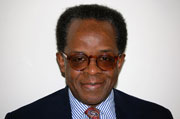
Arnold Pinkney: “Tailor” of democracy
By Lee A. Daniels, NNPA Columnist
It’s not likely that the name of Arnold Pinkney, who died at 83 in Cleveland on Jan. 13, 2014 and is widely-known among the public. But it was nonetheless historically appropriate that his funeral was held Jan. 18, 2014 the weekend of the holiday honoring Dr. Martin Luther King, Jr. For Arnold Pinkney’s business acumen and civic activism validated to an extraordinary degree the Civil Rights Movement’s promise of what destroying the barriers to Black Americans’ full participation in American society could produce.
A striking marker of Arnold Pinkney’s significance can be gleaned from the fact that, in effect, his was a state funeral. John Kasich, Ohio’s Republican Governor, ordered flags throughout the state flown at half-staff, and he and an array of elected and appointed government officials from across the state and the Congress attended the service at Cleveland’s Olivet Institutional Baptist Church. President Obama sent a message of condolence, as did Rev. Jesse Jackson, whose 1984 insurgent campaign for the Democratic nomination for President Arnold Pink-ney managed.
That latter fact, for those who don’t know of Pinkney’s activism, strongly suggests the important role he played in the Black freedom struggle of the latter half of the 20th century. His participation in politics began four decades before that, however. As a teenager listening to a radio broadcast of the Democratic National Convention in 1948, he heard Minneapolis Mayor Hubert H. Humphrey (later, A U.S. Senator, and President Lyndon Johnson’s Vice President) fervently urge delegates to support a strong civil rights plank – one of the actions at the convention which provoked southern segregationists to break with the Democrats and form the short-lived Dixiecrat Party.
Pinkney took the lesson – the unbreakable connection between politics and Black Americans’ advancement – to heart. The campaigns of white and Black candidates he was involved in by themselves suggest a substantial chunk of America’s political history of the post-World War II era.
But none were more important than two involving the brothers Carl and Louis Stokes. In 1967, he helped steer Carl Stokes to victory as the first Black Mayor of Cleveland – the first Black American ever to become Mayor of a major American city. A year later, he managed the campaign that made Louis Stokes the first Black Ohioan ever elected to Congress and only the ninth Black American in Congress in the 20th century. (Democrats William Clay of St. Louis and Shirley Chisholm of Brooklyn were also elected to Congress that year.)
Those signal achievements were hardly the end of Pinkney’s activism in Cleveland, and state and national politics; but just noting them is sufficient to underscore the historical significance of his death at the moment of this year’s Dr. King Holiday.
It reminds us how powerful Dr. Martin Luther King, Jr.’s inspiration remained even amid the great turbulence and violence of the late 1960s – when his assassination seemed to shelve discussion about the continuing usefulness of nonviolence as a tool of Black advancement. In fact, those were the years when Black Americans, empowered by the Civil Rights Act of 1964 and the Voting Rights Act of 1965, were able to focus their full strength on traditional American political activity.
That, in turn, led to such results as: the sharp rise in the number of Black elected officials by the early 1970s; the founding of the Congressional Black Caucus in 1970, Shirley Chisholm’s insurgent campaign for the Democratic Party Presidential nomination in 1972; Jesse Jackson’s crucial insurgent Presidential campaigns of the 1980s, and, further down the road, President Obama’s victories – victories that were grounded in the extraordinary decades-long commitment of Black voters to play “smart politics.”
Taylor Branch makes the point in the introduction to the third volume of his magisterial narrative of Dr. King and the civil rights years that “Nonviolence is an orphan among democratic ideas. It has nearly vanished from public discourse even though the most basic element of a free government – the vote – has no other meaning. Every ballot is a piece of nonviolence, signifying hard-won consent to raise politics above firepower and bloody conquest.”
In other words, even as they rhetorically ignored nonviolence, Blacks were busy adapting and applying the energy of the nonviolent, mass-action protest movement and its hard-won products directly to the mainstream political system. That was the kind of work at which Arnold Pinkney was so much an expert.
So, one could say that Arnold Pinkney was an exemplary political activist. But he could also be considered a “tailor” – a tailor of democracy because he was one of the many people spread across the country who amid and after the days of the Civil Rights Movement, worked to institutionalize the principles and practices of democracy: to sew them, one might say, into the fabric of American society.


Be the first to comment